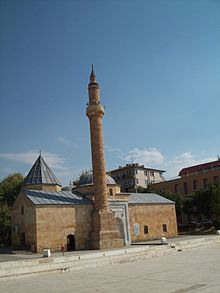Ahi Evran
- Machine translation, like DeepL or Google Translate, is a useful starting point for translations, but translators must revise errors as necessary and confirm that the translation is accurate, rather than simply copy-pasting machine-translated text into the English Wikipedia.
- Consider adding a topic to this template: there are already 494 articles in the main category, and specifying
|topic=will aid in categorization. - Do not translate text that appears unreliable or low-quality. If possible, verify the text with references provided in the foreign-language article.
- You must provide copyright attribution in the edit summary accompanying your translation by providing an interlanguage link to the source of your translation. A model attribution edit summary is
Content in this edit is translated from the existing Turkish Wikipedia article at [[:tr:Ahî Evran]]; see its history for attribution. - You may also add the template
{{Translated|tr|Ahî Evran}}to the talk page. - For more guidance, see Wikipedia:Translation.

Sheikh Pir Nasiruddin Abul Hakayik Pir Mahmud bin Ahmed Ahi Evran bin Abbas Veli al-Khoyi (1169–1261), commonly known as Ahi Evran or Pir Ahi Evren-ı Veli, was a Turkic Alevi Sufi saint, preacher, philosopher, poet who wrote 20 books. He is mostly remembered as the founder and leader of the Ahi Brotherhood.[1]
Life
Born in Khoy, Southern Azerbaijan in present-day Iran in 1169,[2] he moved to Kayseri, Turkey and established the Ahi guild there.[3] He was skilled in the leatherworking trade and he organized guilds from 32 different professions. He led and organized the Ahis into a force capable of fighting the invading Mongols.[1]
He was a Bektashi preacher who had gone to Trabzon during the Empire of Trebizond to spread Islam. As a scholar, he was taught by teachers in Baghdad and Khorasan.[1]
He was killed by Mongols in Kırşehir on 1 April 1261. His grave site is in debate, but thought to be in Boztepe. The site is near Trabzon. It is considered as sacred and has been visited by many people. This grave, however, may instead be that of a clan leader or a Greek metropolitan who had accepted Islam. According to Şakir Şevket, in 1863, Muslim preacher Sheykh Haji Hakki Efendi was inspired to build a place near Ahi Evren's grave. So when Sheykh Haji Hakki Efendi died in 1890, he was buried there. The government then built a tomb and mosque at the site.
Legacy

A new insect species discovered in Turkey by assistant professor Mahmut Erbey at Ahi Evran University was named Evrani to honor the university and the saint.[4] An annual festival is held in Kırşehir, where its organized by the local chambers of commerce.[1]
See also
References
- ^ a b c d Darke, Diana (2022). The Ottomans: A Cultural Legacy. Thames & Hudson. pp. 86, 88. ISBN 978-0-500-77753-4.
- ^ Mikail Bayram, Ahi Evran ve Ahi Teşkilâtının Kuruluşu, Konya 1991, s.135
- ^ Salih Özkan, Türk Eğitim Tarihi, Nobel Yayım Dağıtım, 2.basım Mart 2008, s.44 ISBN 978-605-395-089-9
- ^ sabah, daily (17 August 2015). "New insect species registered in Turkey". Daily Sabah. Retrieved 30 November 2021.
Sources
- Öztürk, Özhan (2005). Karadeniz : ansiklopedik sözlük (1. basım ed.). İstanbul: Heyamola Yayınları. ISBN 975-6121-00-9. OCLC 63737636.
- "Alevi Önderleri (Horasan Piri Hünkar Hacı Bektaş Veli) |". 26 April 2017. Archived from the original on 26 April 2017. Retrieved 30 November 2021.
- "Haci Bektas Veli and Bektashi Order | All About Turkey". www.allaboutturkey.com. Retrieved 30 November 2021.
- "Traditional Institutions - Dervish Orders". www.ktb.gov.tr. Retrieved 30 November 2021.
External links
- Ahilik ve Yaran
- v
- t
- e










